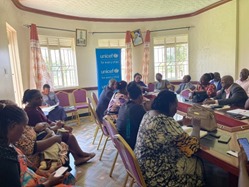Today marked the beginning of a three-day exchange learning visit in Namayingo District, organized by Naguru Teenage Centre (NTC) with support from UNICEF under the Empowering Adolescent Girls and Young Women (AGYW) project. The initiative brings together a delegation from Kamuli District Local Government, offering them a unique opportunity to learn from Namayingo’s outstanding practices in Sexual and Reproductive Health and Rights (SRHR), teenage pregnancy prevention, and multi-sectoral coordination.
The entry meeting held today officially launched the visit, setting the tone for an insightful knowledge-sharing experience. Representatives from both districts, including health officials, community development officers, education leaders, and youth focal persons all gathered to align expectations and identify key areas of focus. The warm reception from the Namayingo District leadership underscored the spirit of collaboration and commitment toward improving adolescent health outcomes across districts.
Namayingo has registered significant progress in advancing SRHR interventions, particularly through community-driven models that promote youth participation, school retention for girls, and male involvement in reproductive health programs. These best practices have made the district a model for effective coordination and service delivery, providing a practical learning environment for Kamuli’s visiting team.
Throughout the exchange, the Kamuli team will engage in on-site visits to health facilities, schools, and community structures that have successfully implemented youth-friendly initiatives. These interactions aim to foster peer-to-peer learning, enabling Kamuli to adopt strategies that can be contextualized to its own realities.
The visit also emphasizes the importance of district-level leadership and accountability in driving sustainable change. By observing Namayingo’s multisectoral coordination mechanisms, Kamuli District hopes to strengthen its own governance systems to better address challenges such as teenage pregnancy, early marriage, and barriers to SRHR access.
As Day 1 concludes, participants expressed optimism and renewed energy to translate lessons learned into tangible actions. The collaboration between NTC, UNICEF, and local governments continues to demonstrate the power of shared learning in shaping healthier, more empowered futures for adolescent girls and young women.
This exchange visit is more than an activity, its is a bridge between knowledge and transformation, reinforcing that when communities learn together, they grow stronger together.








